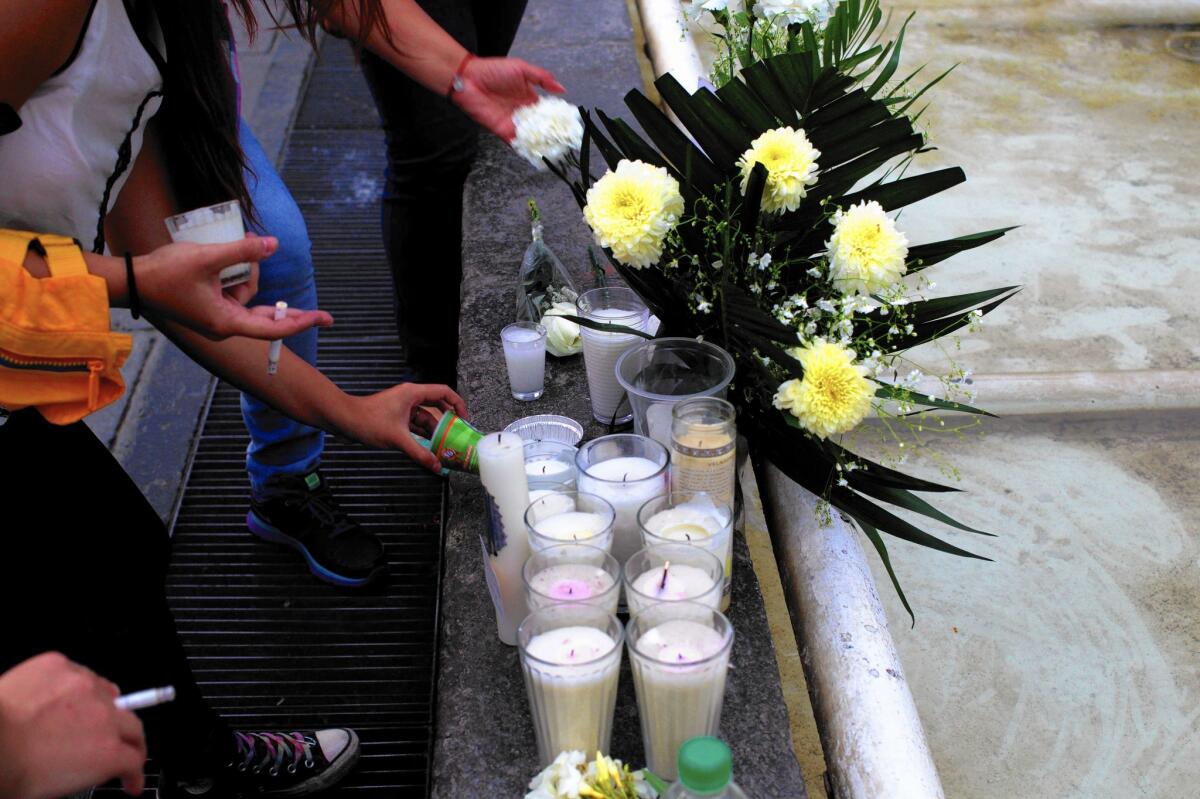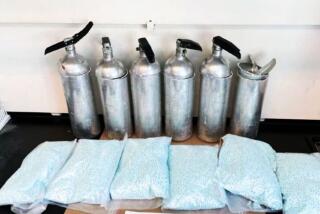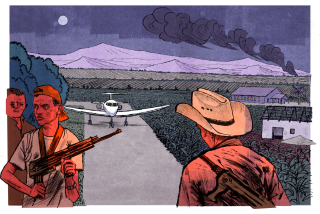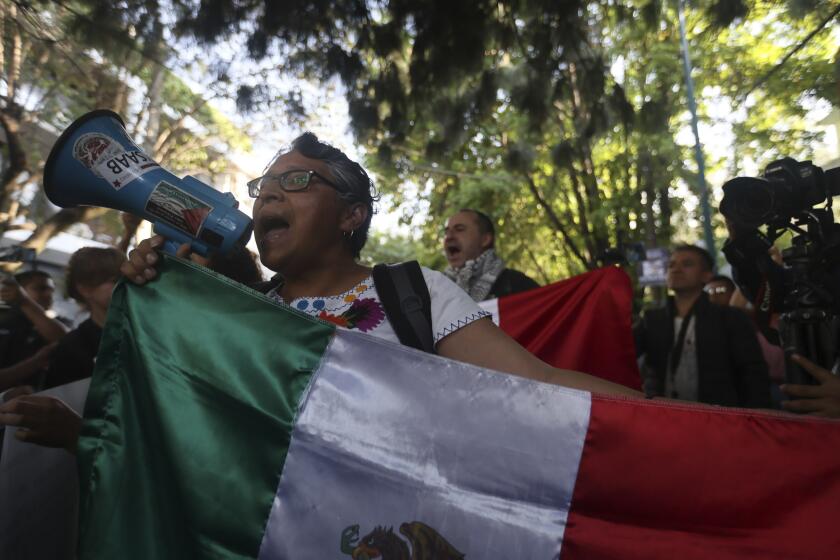A new force in drug trafficking reaches Tijuana

Menacing, crudely written signs hung from highway bridges or left with mutilated corpses have delivered the message: Mexico’s fastest-growing drug trafficking group, Cartel Jalisco Nueva Generacion, is now in Tijuana — and fighting to expand its influence.
The group’s growing presence coincides with a surge in homicides in Tijuana that started last spring, authorities said, and have continued in these first weeks of the new year, with many of the perpetrators and victims described as low-ranking members of the city’s neighborhood drug trade.
Drug-related killings accounted for more than 80% of Tijuana’s 670 homicides in 2015, the highest number in five years, according to the Baja California Attorney General’s Office. A total of 71 homicides last month marked the most violent January in the city since 2010.
With the participation of Nueva Generacion, the battle for control of Tijuana’s neighborhood drug trade and lucrative smuggling routes to the United States has entered a new phase, one that has left the Sinaloa cartel increasingly on the defensive and led to the defections of some of its members, according to law-enforcement officials.
What happens with Nueva Generacion over the next year is going to reshape the landscape of drug trafficking in Mexico.
— David Shirk, professor, University of San Diego
Nueva Generacion “is the new player in town that is trying to gain control of the Tijuana plaza,” said Gary Hill, assistant special agent in charge of the U.S. Drug Enforcement Administration’s San Diego office.
While the extent of Nueva Generacion’s physical presence and influence is the subject of some debate, there is consensus about this: The group is now involved in both the street-level sales, “narcomenudeo,” and cross-border smuggling activities, called “trasiego.”
Daniel de la Rosa, Baja California’s public safety secretary, said Nueva Generacion does not have a significant physical presence in the state, but has focused on forging alliances with members of the Tijuana underworld in a challenge to the Sinaloa cartel, which has been widely acknowledged in recent years as the city’s dominant drug trafficking group. Their rivalry preceded the recent recapture of the Sinaloa organization’s longtime leader, Joaquin “El Chapo” Guzman.
“As far as a visible head of Grupo Jalisco Nueva Generacion, we don’t have one,” De la Rosa said. “You don’t see the presence of their operators, their hit men, criminal logistics. The only thing that we’ve detected is smuggling, and the protection of their loads heading to the United States, and the importing of cash and weapons from the United States.”
For years, Tijuana was known as the domain of the Arellano Felix Organization, and that family’s control extended over both the smuggling of drugs to the United States and the local drug trade, authorities said.
That supremacy unraveled amid the detentions and deaths of its leaders and challenges from rivals in the drug trade. The final blow came in 2008, when an Arellano former lieutenant, Teodoro Garcia Simental, mounted a bloody challenge to his former bosses, with backing from the Sinaloa cartel.
Now, it seems the tables have turned.
A key figure said to have switched his allegiance from the Sinaloa cartel to Nueva Generacion is Arturo Gomez Herrera, better known by his nickname, “El Gross.”
According to Tijuana police, “El Gross” now leads a criminal cell that has been fighting for control of the drug trade in Tijuana’s impoverished Sanchez Taboada neighborhood. Recently, police announced the arrest of a 19-year-old they said was a hit man working for “El Gross” and connected him to the killings of at least five neighborhood drug dealers.
See more of our top stories on Facebook >>
Cartel Jalisco Nueva Generacion, often called CJNG, is a relatively new player in Mexico that emerged from a power struggle among drug traffickers in the country’s central region. The group rose to power around 2009 with the decline of the Valencia-Milenio cartel, according to the U.S. State Department.
The current leader is said to be 49-year-old Nemesio Oseguera Ramos, “El Mencho,” a native of Michoacan “who has been significantly involved in drug trafficking activities since the 1990s,” according to the U.S. Treasury Department.
Oseguera served nearly three years in a U.S. prison following a 1994 federal conviction of heroin distribution in California’s Northern District. In 2014, he was indicted in U.S. federal court in Washington. And last April, the U.S. Treasury Department named Oseguera a “kingpin,” a designation that involves freezing any of his or his group’s U.S.-based or U.S.-controlled assets and prohibiting transactions with them.
The U.S. State Department is offering up to $5 million for information leading to his capture and conviction.
On both sides of the U.S.-Mexico border, law enforcement authorities and drug experts are watching the group closely. “What happens with Nueva Generacion over the next year is going to reshape the landscape of drug trafficking in Mexico,” said David Shirk, a professor at the University of San Diego, who studies the drug trade and Mexico’s justice system.
Alejandro Hope, a Mexican analyst and the security and justice editor of the website El Daily Post, expects Nueva Generacion and other cartels to continue fragmenting.
“The large-scale, vertical, highly visible, highly identifiable cartels that were so prominent between the 1980s and the 2000s are increasingly a thing of the past,” Hope said. “Thinking about cartels is a misnomer about what is going on in Mexico. The fragmentation that has dominated the Mexican underworld is here to stay. Ten years from now, neither Sinaloa nor Nueva Generacion will exist.”
Dibble writes for the San Diego Union-Tribune.
sandra.dibble@sduniontribune.com
ALSO
Trump wins South Carolina primary: ‘Let’s put this thing away’
FBI rebuts reports that county reset S.B. shooter’s iCloud password without consent
Murder, torture, drugs: Former beauty queen says that’s not the ‘El Chapo’ she knows
More to Read
Start your day right
Sign up for Essential California for news, features and recommendations from the L.A. Times and beyond in your inbox six days a week.
You may occasionally receive promotional content from the Los Angeles Times.






